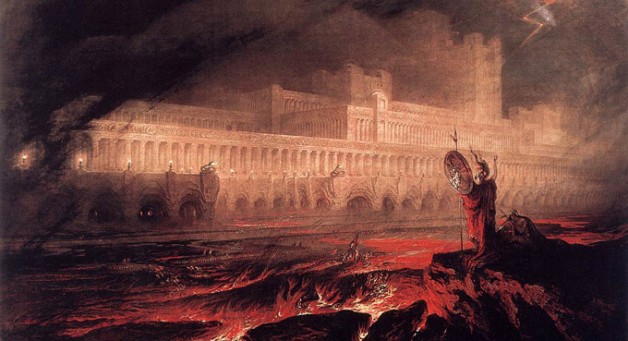Some boast of chariots, and some of horses;
but we boast of the name of the Lord our God.
Psalm 20:7
The strength of man does not impress God. Our strength does not make us strong Christians, but rather the Lord, who is truly strong, makes us so. I write this because many people tend to despair over the decline of modern culture and society. For over a century the Church has lost, and is still in the process of losing, almost every cultural battle in the West. Should the collapse of modern culture lead to despair? No! Because what is certain is not that our feeble efforts will win the contemporary ‘culture wars,’ but that God’s providence will definitively triumph over all the forces of evil.
To see the big picture of providence, history helps; like standing on a tower to see the surrounding countryside, history provides a better vantage point from which to discern the workings of providence.
The most powerful Roman Emperor was Augustus, given the title ‘divus’ because he was worshiped as a god after his death. Yet he was not invincible; he tried to conquer Germany, but instead lost three whole Roman legions—all three ambushed and massacred in the Battle of Teutoburg Forest. Augustus, as Suetonius reports, then spent months wandering the halls of his palace, his hair and beard growing long, striking his head against the wall and shouting, ‘Give me back my legions!’ Some god.
Those Germanic tribes would, centuries later, conquer the western Roman Empire. By then the Roman Empire had just converted to Christianity, so those early Christians saw the collapse of the empire as a catastrophe. Germanic tribes had defeated both pagan and Christian Rome in turn. The Christians of the time watched impotently as Rome collapsed. In Roman North Africa, St. Augustine of Hippo lay dying as the Vandals laid siege to Hippo: Augustine died shortly before the city, and all of North Africa, fell to them. Christianity appeared to have been snuffed out by the forces of violence and anarchy as one Roman province after another fell to the Germanic barbarians.
But God’s providence prevails. He was to conquer the pagan Germans; He would accomplish what man could not. The Germanic Angles and Saxons had conquered Roman Britain, pagans subjugating Christians. But Pope St. Gregory the Great sent St. Augustine of Canterbury (not Hippo) to convert them, and that he did. He was so successful that a few generations later those former pagans became monks and missionaries.
St. Boniface was one of them, returning to his ancestral homeland in Germany and converting it. His efforts brought Germany into the Church, laying the groundwork for Charlemagne to re-found the Roman Empire in the West—now the Holy Roman Empire. A region and peoples that were the scourge of civilization, the defeaters of ‘god-emperors’ and the western empire itself, were conquered by Christ and his missionaries, to become a central pillar of Christendom.
The brawn of Rome at her peak, even the mightiest Roman legions, could not conquer pagan Germany. But holy monks and preachers, unarmed and insignificant in terms of worldly power, did. The forces that vanquished the Roman Empire itself were bested by humble preachers! Monks coming from the ashes of a collapsed empire laid the foundation for medieval Christendom. God’s providence won.
We fight the good fight in our time and culture, but, now as then, any victory is through providence. Defeats now only set the stage for later and greater victories, victories we cannot yet see. St. Augustine of Hippo could not have seen that he stood at the end of the ancient world and on the threshold of the medieval world; he could only see the collapse of the Roman Empire to vicious barbarians. And yet, while this was a disaster from his view, it prepared the way for Christendom and the great faith of the Middle Ages. Those barbarians were defeated, but in God’s time and by His means, not ours. We fight, but only God conquers. The name of the Lord our God leads us to his victory in heaven.
Image: John Martin, Pandemonium







